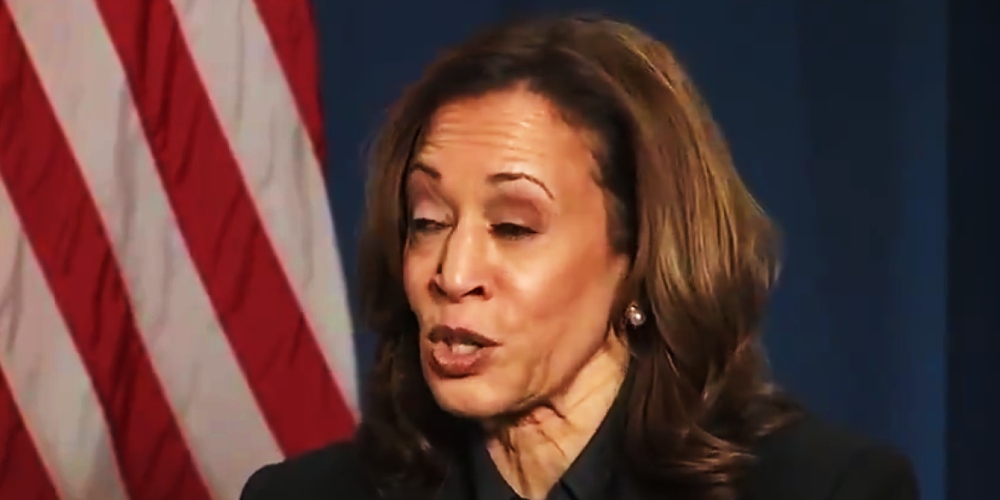In what can only be described as a glaring display of political deflection, Vice President Kamala Harris has once again showcased her adeptness at dodging hard-hitting questions about her economic policies.
During her first solo TV interview since becoming the Democratic presidential nominee, Harris was questioned by Philadelphia’s 6 ABC anchor Brian Taff on her “specific” plans to alleviate the financial burdens faced by Americans. Rather than addressing the pressing issue, Harris embarked on a nostalgic journey about her “middle-class” upbringing, leaving critical economic questions unanswered and the public in the lurch.
“Well, I’ll start with this. I grew up a middle-class kid,”
“My mother raised my sister and me. She worked very hard. She was able to finally save up enough money to buy our first house when I was a teenager.”
“I grew up in a community of hard-working people, you know, construction workers and nurses and teachers. And I try to explain to some people who may not have had the same experience. You know, a lot of people will relate to this.”
“You know, I grew up in a neighborhood of folks who were very proud of their lawn,”
“And I was raised to believe and to know that all people deserve dignity, and that we as Americans have a beautiful character. You know, we have ambitions and aspirations and dreams, but not everyone necessarily has access to the resources that can help them fuel those dreams and ambitions.”
“So when I talk about building an opportunity economy, it is very much with the mind of investing in the ambitions and aspirations and the incredible work ethic of the American people and creating opportunity for people, for example, to start a small business.”
Oh my goodness this is an absolute train wreck.
Reporter: What are your specific plans to bring down prices?
Kamala: "I grew up a middle class kid… I grew up in a neighborhood of folks who were very proud of their lawn. Ya know?"pic.twitter.com/lhOdWoygy2
— Greg Price (@greg_price11) September 13, 2024
After her lengthy digression into her childhood memories, Harris touted her proposals to give start-up businesses a “$50,000 tax deduction” and new home buyers a “$25,000 down payment assistance.” Yet, these statements did little to clarify how her policies would directly impact the issue at hand: lowering prices for everyday Americans.
“These are some examples of what I mean when I talk about an opportunity economy, and a lot of it has to do with just the community I was raised in and the people that I admire who work hard, you know, and deserve to have, you know, their dreams fulfilled because they’re prepared to work for it,”
Critics were quick to lambast Harris’s response, highlighting her inability to provide concrete answers.
“This is not a parody. This is actual real life… the real @KamalaHarris. And she’s a complete joke,”
“It takes some species of talent to filibuster for 90 straight seconds while saying nothing [at] all of value,”
“She repeated this canned rehearsed line twice in the debate,”
“Ah, yes, I often find myself thinking who has a nice lawn when discussing plans to deal with inflation. We’re doomed if Kamala wins,”
The evasion didn’t stop there. In a similar vein, during the ABC News debate, when asked by moderator David Muir whether Americans are economically “better off than they were four years ago,” Harris repeated her well-rehearsed narrative.
“So I was raised as a middle-class kid,”
“And I am actually the only person on this stage who has a plan that is about lifting up the middle class and working people of America. I believe in the ambition, the aspirations, the dreams of the American people, and that is why I imagine and have actually a plan to build what I call an opportunity economy.”
This pattern of responses raises critical questions: Why does the Biden-Harris administration continually evade direct questions about their policies? Is this a deliberate ploy to distract from their lack of actionable solutions? As we approach the 2024 election, the American people deserve clear, straightforward answers, not political runarounds that serve only the interests of those in power.
Controlling Protein Is One of the Globalists’ Primary Goals
Between the globalists, corporate interests, and our own government, the food supply is being targeted from multiple angles. It isn’t just silly regulations and misguided subsidies driving natural foods away. Bird flu, sabotaged food processing plants, mysterious deaths of entire cattle herds, arson attacks, and an incessant push to make climate change the primary consideration for all things are combining for a perfect storm to exacerbate the ongoing food crisis.
The primary target is protein. Specifically, they’re going after beef as the environmental boogeyman. They want us eating vegetable-based proteins, lab-grown meat, or even bugs instead of anything that walked the pastures of America. This is why we launched a long-term storage prepper beef company that provides high-quality food that’s shelf-stable for up to 25-years.
At Prepper All-Naturals, we believe Americans should be eating real food today and into the future regardless of what the powers-that-be demand of us. We will never use lab-grown beef. We will never allow our cattle to be injected with mRNA vaccines. We will never bow to the draconian diktats of the climate change cult.
Visit Prepper All-Naturals and use promo code “veterans25” to get 25% off plus free shipping on Ribeye, NY Strip, Tenderloin, and other high-quality cuts of beef. It’s cooked sous vide, then freeze dried and packaged with no other ingredients, just beef. Stock up for the long haul today.


